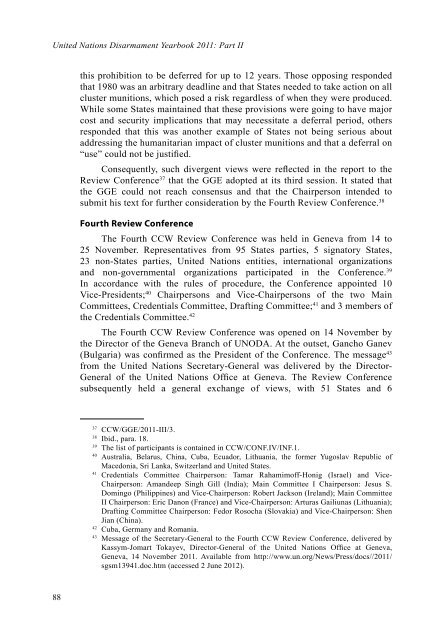DYB2011-Part-II-web
DYB2011-Part-II-web
DYB2011-Part-II-web
You also want an ePaper? Increase the reach of your titles
YUMPU automatically turns print PDFs into web optimized ePapers that Google loves.
United Nations Disarmament Yearbook 2011: <strong>Part</strong> <strong>II</strong><br />
88<br />
this prohibition to be deferred for up to 12 years. Those opposing responded<br />
that 1980 was an arbitrary deadline and that States needed to take action on all<br />
cluster munitions, which posed a risk regardless of when they were produced.<br />
While some States maintained that these provisions were going to have major<br />
cost and security implications that may necessitate a deferral period, others<br />
responded that this was another example of States not being serious about<br />
addressing the humanitarian impact of cluster munitions and that a deferral on<br />
“use” could not be justified.<br />
Consequently, such divergent views were reflected in the report to the<br />
Review Conference37 that the GGE adopted at its third session. It stated that<br />
the GGE could not reach consensus and that the Chairperson intended to<br />
submit his text for further consideration by the Fourth Review Conference. 38<br />
Fourth Review Conference<br />
The Fourth CCW Review Conference was held in Geneva from 14 to<br />
25 November. Representatives from 95 States parties, 5 signatory States,<br />
23 non-States parties, United Nations entities, international organizations<br />
and non-governmental organizations participated in the Conference. 39<br />
In accordance with the rules of procedure, the Conference appointed 10<br />
Vice-Presidents; 40 Chairpersons and Vice-Chairpersons of the two Main<br />
Committees, Credentials Committee, Drafting Committee; 41 and 3 members of<br />
the Credentials Committee. 42<br />
The Fourth CCW Review Conference was opened on 14 November by<br />
the Director of the Geneva Branch of UNODA. At the outset, Gancho Ganev<br />
(Bulgaria) was confirmed as the President of the Conference. The message43 from the United Nations Secretary-General was delivered by the Director-<br />
General of the United Nations Office at Geneva. The Review Conference<br />
subsequently held a general exchange of views, with 51 States and 6<br />
37 CCW/GGE/2011-<strong>II</strong>I/3.<br />
38 Ibid., para. 18.<br />
39 The list of participants is contained in CCW/CONF.IV/INF.1.<br />
40 Australia, Belarus, China, Cuba, Ecuador, Lithuania, the former Yugoslav Republic of<br />
Macedonia, Sri Lanka, Switzerland and United States.<br />
41 Credentials Committee Chairperson: Tamar Rahamimoff-Honig (Israel) and Vice-<br />
Chairperson: Amandeep Singh Gill (India); Main Committee I Chairperson: Jesus S.<br />
Domingo (Philippines) and Vice-Chairperson: Robert Jackson (Ireland); Main Committee<br />
<strong>II</strong> Chairperson: Eric Danon (France) and Vice-Chairperson: Arturas Gailiunas (Lithuania);<br />
Drafting Committee Chairperson: Fedor Rosocha (Slovakia) and Vice-Chairperson: Shen<br />
Jian (China).<br />
42 Cuba, Germany and Romania.<br />
43 Message of the Secretary-General to the Fourth CCW Review Conference, delivered by<br />
Kassym-Jomart Tokayev, Director-General of the United Nations Office at Geneva,<br />
Geneva, 14 November 2011. Available from http://www.un.org/News/Press/docs//2011/<br />
sgsm13941.doc.htm (accessed 2 June 2012).


